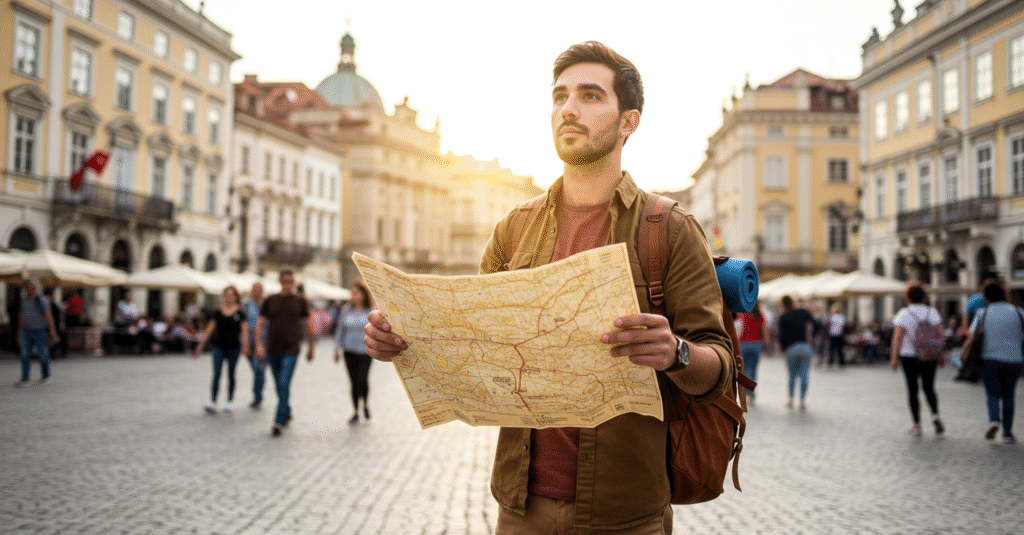Why Travel Safety Should Be Every Solo Traveler’s First Priority
Traveling alone is liberating in a way nothing else can match. You decide where to go, when to stop, and how to spend your days without compromise. Whether you’re sipping coffee in a tucked-away courtyard, exploring new hiking trails, or navigating bustling city streets, solo travel is a gift of independence.
But with great freedom comes the need for responsibility. Traveling alone doesn’t have to be risky, but it does require extra awareness. The world is dynamic, and safety today includes not only the timeless concerns like pickpockets and scams, but also digital-age challenges like fraudulent QR codes, identity theft, and navigating new tech responsibly.
This guide blends classic safety wisdom with modern tools, giving solo travelers everything they need to explore with confidence. From preparing before departure to choosing safe accommodation, understanding scams, using technology wisely, and staying calm in emergencies—this is your ultimate blueprint for safer, smarter solo adventures.
What Are the Biggest Risks Solo Travelers Face?
Solo travel is empowering, but it also means you’re your own safety net. Here are the most common challenges:
- Petty theft – Pickpockets in crowded spaces, bag-snatching, or subtle distractions.
- Digital scams – Fake QR codes pasted over legitimate ones at restaurants, taxis, or ATMs.
- Unwanted attention – Ranging from subtle annoyance to harassment in some regions.
- Emergencies – Illness, accidents, or sudden changes in local conditions.
- Isolation stress – Anxiety, loneliness, or lack of mental health safeguards.
- Cultural missteps – Unintentional breaches of local etiquette can attract negative attention.
How Can You Prepare Before Leaving?
1. Research and Plan
- Check government advisories through authority sites like the U.S. State Department or UK Foreign Travel Advice.
- Look up safe neighborhoods on Google Maps reviews, hostel forums, and traveler blogs.
- Understand local etiquette using resources like the BBC Country Guides.
2. Secure Your Documentation
- Digital backups: Store encrypted copies of essential IDs in a secure cloud.
- Printed copies: Keep a set separate from the originals.
- Identity wallet apps: Many embassies now recognize official digital ID wallets for faster recovery in emergencies.
3. Don’t Skip Insurance
Choose travel insurance that covers:
- Medical emergencies.
- Trip cancellations.
- Digital fraud incidents and lost items.
- Mental health or counseling support while abroad if needed.
4. Smart Packing
- Minimal valuables, clothing that blends with locals.
- Crossbody anti-theft bag and portable phone charger.
- Compact gadgets: flashlight, lockable luggage zippers, and doorstop alarm.
How Do You Stay Safe in Accommodation Choices?
Your accommodation is your safe base—choosing wisely matters.
Key Tips
- Location over cost: A central, well-connected neighborhood is better than a remote bargain rental.
- Security features: Look for 24-hour reception, CCTV, secure lockers, or smart door codes.
- Reviews: Prioritize reviews that mention safety, staff helpfulness, and neighborhood feel.
Where to Stay?
| Accommodation | Benefits | Risks | Best Fit |
|---|---|---|---|
| Hotel | Professional staff, secure entry, privacy, often with safes | Can be pricier | First-time solo travelers, those who prefer privacy |
| Hostel | Budget-friendly, social, often central | Shared dorms reduce privacy | Social travelers wanting to meet others |
| Airbnb / Vacation Rental | Local immersion, space & flexibility, often with kitchens | Quality varies, less oversight | Experienced travelers seeking authentic stays |
| Female-only Hostels / Co-living | Safer community feel, supportive atmosphere | Not available everywhere | Women travelers seeking security + social vibe |
How Can You Navigate Transportation Safely?
Transportation is one of the most sensitive areas for solo travelers.
- Use verified services – Stick to official ride-hailing apps or licensed taxis. Always confirm plates and driver IDs.
- Arrival timing – Avoid late-night arrivals into unfamiliar cities when possible.
- Public transit hacks – Keep your bag on your lap, avoid empty carriages late at night, and use prepaid cards instead of cash.
- QR caution – Double-check QR scan points at vending machines, buses, or tickets. If unsure, pay directly through verified phone apps.
How Do You Avoid Scams?
Scams are as old as travel itself, but they evolve constantly.
The Classics
- Street distractions (e.g., dropped item, spilled drink).
- Taxi drivers exaggerating fares.
- Pushy “free gifts” that turn into demands.
The Newer Tricks
- Fake QR codes: Stickers tricking you into fraudulent payment sites.
- Deepfake phone calls: Criminals posing as authorities.
How to Protect Yourself
- Bookmark official travel or transit apps before arrival.
- Verify QR menus or tickets with the restaurant or station.
- Decline free offers politely but firmly.
- If contacted with “urgent demands” by phone/email, only trust official channels.
What Daily Safety Habits Work Best?
Safety becomes natural when built into routines:
- Dress to blend in – tone down flashy outfits.
- Stay connected – send your itinerary to friends/family daily.
- Mind drinks – pour your own, keep it in hand.
- Digital mindfulness – Turn off auto-connect WiFi, Bluetooth, and NFC.
- Gut check – If something feels wrong, excuse yourself and leave.
How Does Technology Keep You Safer?
Modern tools add a powerful layer of protection.
- AI-powered travel apps: Tools like TripIt, Google Gemini, or language-translating apps help provide real-time risk alerts and local cultural advice.
- Offline maps: Maps.me or Google Maps with offline features so you’re never stranded.
- VPN protection: Always use one for online banking or transactions. See FTC’s advice on public Wi-Fi.
- Satellite texting devices: Lightweight tools let you text even without phone service in remote areas.
What Should You Do in Emergencies?
- Medical issue: Use travel insurance support lines, know nearest hospitals (saved offline).
- Lost passport: Contact your embassy immediately. Copies or digital wallets speed up replacement.
- Theft: File a local police report and contact insurers quickly.
- Mental strain: Remember, well-being matters. Take downtime, seek out local expat communities, or use mindfulness apps.
FAQs About Solo Travel Safety
1. Is solo travel safe for women?
Yes—with thoughtful planning, millions of women travel solo safely. Opt for secure accommodations, keep communication lines open, and trust instincts.
2. How do I protect my money while traveling alone?
Use a mix: part in a main wallet, part hidden, a backup card stored separately, and avoid dependence on one payment method.
3. What if I feel unsafe using public transport?
Move to busier sections of a train, exit as soon as possible, or report concerns to officials.
4. Can I use dating or social apps while traveling solo?
Yes, but meet only in public spaces, never share accommodation details, and tell someone your plan.
5. What’s the safest way to meet locals or other travelers?
Join structured group tours, local cooking classes, or walking tours—organized events balance safety with new experiences.
Final Thoughts: Traveling Solo With Confidence
The joy of solo travel lies in freedom—curating your own journey while building unmatched confidence along the way. Safety doesn’t mean being fearful, but instead being empowered. By making smart decisions, blending traditional awareness with modern tools, and listening to your instincts, you create a protective bubble around your adventure.
The world is exciting, and it welcomes explorers who are wise enough to travel thoughtfully. A little preparation today paves the way for stories you’ll cherish for a lifetime.
Safe travels—may your next solo trip be full of enriching experiences and safe returns.

